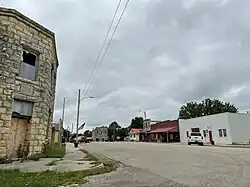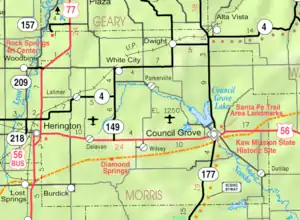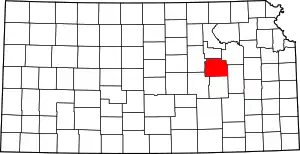Dwight, Kansas | |
|---|---|
 Downtown area (2021) | |
 Location within Morris County and Kansas | |
 KDOT map of Morris County (legend) | |
| Coordinates: 38°50′41″N 96°35′42″W / 38.84472°N 96.59500°W[1] | |
| Country | United States |
| State | Kansas |
| County | Morris |
| Founded | 1887 |
| Incorporated | 1905 [2] |
| Named for | Dwight Rathbone |
| Government | |
| • Type | Mayor–Council |
| Area | |
| • Total | 0.36 sq mi (0.94 km2) |
| • Land | 0.36 sq mi (0.94 km2) |
| • Water | 0.00 sq mi (0.00 km2) |
| Elevation | 1,503 ft (458 m) |
| Population | |
| • Total | 217 |
| • Density | 600/sq mi (230/km2) |
| Time zone | UTC-6 (CST) |
| • Summer (DST) | UTC-5 (CDT) |
| ZIP code | 66849 |
| Area code | 785 |
| FIPS code | 20-19125 [1] |
| GNIS ID | 485452 [1] |
| Website | dwightks.net |
Dwight is a city in Morris County, Kansas, United States.[1] As of the 2020 census, the population of the city was 217.[4]
History
Dwight had its start in the year 1887 by the building of the Chicago, Kansas and Nebraska Railway through that territory.[5] It was named for Dwight Rathbone, the owner of the original town site.[6] Dwight was incorporated as a city in 1903.[7]
The Chicago, Kansas and Nebraska Railway was foreclosed in 1891 and taken over by Chicago, Rock Island and Pacific Railway, which shut down in 1980 and reorganized as Oklahoma, Kansas and Texas Railroad, merged in 1988 with Missouri Pacific Railroad, merged in 1997 with Union Pacific Railroad. Most locals still refer to this railroad as the "Rock Island".
A post office was established in Dwight on March 19, 1887.[8]
Geography
Dwight is located at 38°50′41″N 96°35′42″W / 38.844602°N 96.594935°W (38.844602, -96.594935).[9] According to the United States Census Bureau, the city has a total area of 0.37 square miles (0.96 km2), all of it land.[10]
Demographics
| Census | Pop. | Note | %± |
|---|---|---|---|
| 1910 | 298 | — | |
| 1920 | 246 | −17.4% | |
| 1930 | 334 | 35.8% | |
| 1940 | 295 | −11.7% | |
| 1950 | 281 | −4.7% | |
| 1960 | 281 | 0.0% | |
| 1970 | 322 | 14.6% | |
| 1980 | 320 | −0.6% | |
| 1990 | 365 | 14.1% | |
| 2000 | 330 | −9.6% | |
| 2010 | 272 | −17.6% | |
| 2020 | 217 | −20.2% | |
| U.S. Decennial Census | |||
2020 census
The 2020 United States census counted 217 people, 90 households, and 59 families in Dwight.[11][12] The population density was 601.1 per square mile (232.1/km2). There were 113 housing units at an average density of 313.0 per square mile (120.9/km2).[12][13] The racial makeup was 82.95% (180) white or European American (82.95% non-Hispanic white), 1.38% (3) black or African-American, 0.0% (0) Native American or Alaska Native, 0.46% (1) Asian, 0.0% (0) Pacific Islander or Native Hawaiian, 0.0% (0) from other races, and 15.21% (33) from two or more races.[14] Hispanic or Latino of any race was 0.92% (2) of the population.[15]
Of the 90 households, 26.7% had children under the age of 18; 55.6% were married couples living together; 27.8% had a female householder with no spouse or partner present. 33.3% of households consisted of individuals and 17.8% had someone living alone who was 65 years of age or older.[12] The average household size was 2.5 and the average family size was 3.1.[16] The percent of those with a bachelor’s degree or higher was estimated to be 23.5% of the population.[17]
20.7% of the population was under the age of 18, 6.5% from 18 to 24, 17.5% from 25 to 44, 35.0% from 45 to 64, and 20.3% who were 65 years of age or older. The median age was 49.3 years. For every 100 females, there were 100.9 males.[12] For every 100 females ages 18 and older, there were 102.4 males.[12]
The 2016-2020 5-year American Community Survey estimates show that the median household income was $45,536 (with a margin of error of +/- $15,927) and the median family income was $68,750 (+/- $19,136).[18] Males had a median income of $38,750 (+/- $22,837) versus $15,750 (+/- $5,715) for females. The median income for those above 16 years old was $32,321 (+/- $5,152).[19] Approximately, 8.5% of families and 10.9% of the population were below the poverty line, including 7.7% of those under the age of 18 and 10.9% of those ages 65 or over.[20][21]
2010 census
As of the census[22] of 2010, there were 272 people, 117 households, and 79 families residing in the city. The population density was 735.1 inhabitants per square mile (283.8/km2). There were 136 housing units at an average density of 367.6 per square mile (141.9/km2). The racial makeup of the city was 93.0% White, 1.5% African American, 0.4% Native American, 0.7% Asian, 0.4% from other races, and 4.0% from two or more races. Hispanic or Latino of any race were 4.8% of the population.
There were 117 households, of which 27.4% had children under the age of 18 living with them, 50.4% were married couples living together, 10.3% had a female householder with no husband present, 6.8% had a male householder with no wife present, and 32.5% were non-families. 28.2% of all households were made up of individuals, and 18.8% had someone living alone who was 65 years of age or older. The average household size was 2.32 and the average family size was 2.78.
The median age in the city was 45.1 years. 21.3% of residents were under the age of 18; 10% were between the ages of 18 and 24; 18.3% were from 25 to 44; 27.3% were from 45 to 64; and 23.2% were 65 years of age or older. The gender makeup of the city was 50.4% male and 49.6% female.
2000 census

As of the census[23] of 2000, there were 330 people, 143 households, and 90 families residing in the city. The population density was 886.8 inhabitants per square mile (342.4/km2). There were 163 housing units at an average density of 438.0 per square mile (169.1/km2). The racial makeup of the city was 94.85% White, 0.30% African American, 0.61% Native American, 0.61% Asian, 1.52% from other races, and 2.12% from two or more races. Hispanic or Latino of any race were 4.85% of the population.
There were 143 households, out of which 29.4% had children under the age of 18 living with them, 53.1% were married couples living together, 6.3% had a female householder with no husband present, and 36.4% were non-families. 33.6% of all households were made up of individuals, and 14.7% had someone living alone who was 65 years of age or older. The average household size was 2.31 and the average family size was 2.96.
In the city, the population was spread out, with 24.2% under the age of 18, 9.1% from 18 to 24, 26.4% from 25 to 44, 23.0% from 45 to 64, and 17.3% who were 65 years of age or older. The median age was 39 years. For every 100 females, there were 100.0 males. For every 100 females age 18 and over, there were 96.9 males.
The median income for a household in the city was $25,909, and the median income for a family was $38,750. Males had a median income of $25,000 versus $20,227 for females. The per capita income for the city was $14,727. About 9.4% of families and 15.1% of the population were below the poverty line, including 17.7% of those under age 18 and 3.3% of those age 65 or over.
Government
The Dwight government consists of a mayor and five council members. The council meets the 3rd Monday of each month at 7PM.[2]
Education
The community is served by Morris County USD 417 public school district. The district high school is Council Grove High School.[24]
Dwight schools were closed through school unification. The Dwight Rockets[25] won the Kansas State High School boys class BB basketball championship in 1966 and 1967.[26]
References
- 1 2 3 4 5 "Dwight, Kansas", Geographic Names Information System, United States Geological Survey, United States Department of the Interior
- 1 2 3 "City of Dwight". The League of Kansas Municipalities. May 27, 2019.
- ↑ "2019 U.S. Gazetteer Files". United States Census Bureau. Retrieved July 24, 2020.
- 1 2 "Profile of Dwight, Kansas in 2020". United States Census Bureau. Archived from the original on November 13, 2021. Retrieved November 13, 2021.
- ↑ "Rock Island Rail History". Archived from the original on June 19, 2011. Retrieved April 18, 2011.
- ↑ Kansas State Historical Society (1916). Biennial Report of the Board of Directors of the Kansas State Historical Society. Kansas State Printing Plant. pp. 246.
- ↑ Blackmar, Frank Wilson (1912). Kansas: A Cyclopedia of State History, Embracing Events, Institutions, Industries, Counties, Cities, Towns, Prominent Persons, Etc. Standard Publishing Company. pp. 556.
- ↑ "Kansas Post Offices, 1828-1961". Kansas Historical Society. Retrieved June 15, 2014.
- ↑ "US Gazetteer files: 2010, 2000, and 1990". United States Census Bureau. February 12, 2011. Retrieved April 23, 2011.
- ↑ "US Gazetteer files 2010". United States Census Bureau. Archived from the original on July 2, 2012. Retrieved July 6, 2012.
- ↑ "US Census Bureau, Table P16: HOUSEHOLD TYPE". data.census.gov. Retrieved January 2, 2024.
- 1 2 3 4 5 "US Census Bureau, Table DP1: PROFILE OF GENERAL POPULATION AND HOUSING CHARACTERISTICS". data.census.gov. Retrieved January 2, 2024.
- ↑ Bureau, US Census. "Gazetteer Files". Census.gov. Retrieved December 30, 2023.
- ↑ "US Census Bureau, Table P1: RACE". data.census.gov. Retrieved January 2, 2024.
- ↑ "US Census Bureau, Table P2: HISPANIC OR LATINO, AND NOT HISPANIC OR LATINO BY RACE". data.census.gov. Retrieved January 2, 2024.
- ↑ "US Census Bureau, Table S1101: HOUSEHOLDS AND FAMILIES". data.census.gov. Retrieved January 2, 2024.
- ↑ "US Census Bureau, Table S1501: EDUCATIONAL ATTAINMENT". data.census.gov. Retrieved January 2, 2024.
- ↑ "US Census Bureau, Table S1903: MEDIAN INCOME IN THE PAST 12 MONTHS (IN 2020 INFLATION-ADJUSTED DOLLARS)". data.census.gov. Retrieved January 2, 2024.
- ↑ "US Census Bureau, Table S2001: EARNINGS IN THE PAST 12 MONTHS (IN 2020 INFLATION-ADJUSTED DOLLARS)". data.census.gov. Retrieved January 2, 2024.
- ↑ "US Census Bureau, Table S1701: POVERTY STATUS IN THE PAST 12 MONTHS". data.census.gov. Retrieved January 2, 2024.
- ↑ "US Census Bureau, Table S1702: POVERTY STATUS IN THE PAST 12 MONTHS OF FAMILIES". data.census.gov. Retrieved January 2, 2024.
- ↑ "U.S. Census website". United States Census Bureau. Retrieved July 6, 2012.
- ↑ "U.S. Census website". United States Census Bureau. Retrieved January 31, 2008.
- ↑ USD 417 website.
- ↑ "Two Unbeaten Teams In Class BB State Tourney", The Salina Journal, 9 March 1966, p.12.
- ↑ "Basketball". KSHSAA. Retrieved January 3, 2017.
Further reading
External links
- City of Dwight
- Dwight - Directory of Public Officials
- Historic Images of Dwight, Special Photo Collections at Wichita State University Library
- Dwight city map, KDOT
